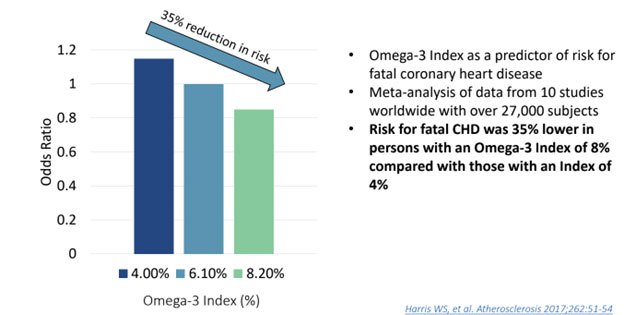What are Omega-3 fatty acids and why are they important?
These specific polyunsaturated fats are critical in maintaining the structure and function of cells across the body. Omega-3 fatty acids are considered “essential” because they cannot be produced by the body and must be obtained through diet or supplements. Three types of omega-3 fatty acids play important roles in human health:
- Marine-derived: eicosapentaenoic acid (EPA), docosahexanoic acid (DHA)
- Plant-derived: alpha-linolenic acid (ALA)
Omega-3 fatty acids are essential in producing hormones that regulate blood clotting, the relaxation and contraction of artery walls (vasoconstriction and vasodilation), and inflammation. Research indicates that omega-3 fatty acids reduce symptoms associated with chronic health conditions such as:
- Cardiovascular disease
- Neurodegenerative disease
- Cancer
- Aging-related diseases
- Infections
- Autoimmune disorders
- Weight loss
- Menopause
- Andropause

Evidence-Based Benefits of Omega-3
- Reduced biomarkers of inflammation in aging
- Reduced risk of death from cardiovascular disease
- Anti-catabolic: reduces bone loss
- Improves cognitive functioning, influencing mood and behavior
- Enhanced immunological function & antiviral response
- Improves aspects of vision and age-related changes in macular health
Where are Omega-3 fatty acids found?
Seafood- such as salmon, mackerel, oysters, and tuna- is the primary source of EPA and DHA omega-3 fatty acids. However, the quality of the fish is critical to determine. This is because toxins such as mercury, dioxins, and organochlorine pesticides readily bioaccumulate in fatty fish. Consuming younger or smaller fish is recommended to avoid or limit exposure to these harmful compounds. ALA omega-3 fatty acids can be found in plant sources such as chia seeds, Brussels sprouts, walnuts, flaxseed, and hemp seed. For this reason, fish oil supplements can be a very effective and efficient method of getting the correct daily dosage of omega-3.
At Premier Physicians, we provide high-quality, medical-grade EPA+DHA+DPA fish oil capsules. It is important to remember that taking any vitamins or dietary supplements should be supervised by a physician. Dr. Kota works with each patient to individualize diet and nutrition planning, including omega-3 fatty acids.
How do I monitor or measure my Omega-3 Levels?
At Premier Physicians, part of our integrative and systemic approach to patient care is testing for omega-3 fatty acids. A desirable omega-3 index (O3I) is considered to be between 8-12%. However, the average American’s O3I is around 4%.

If you are interested in learning more about omega-3 testing or supplements, contact our office at 630-378-9785.

